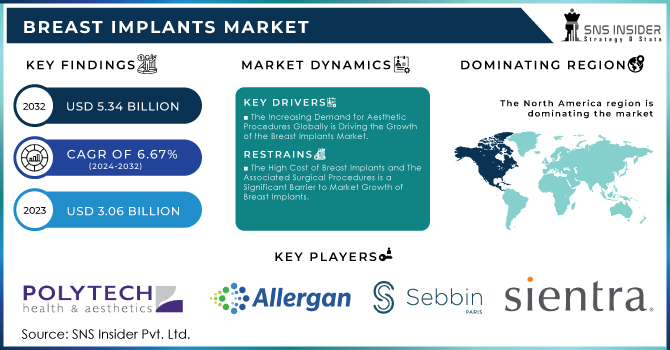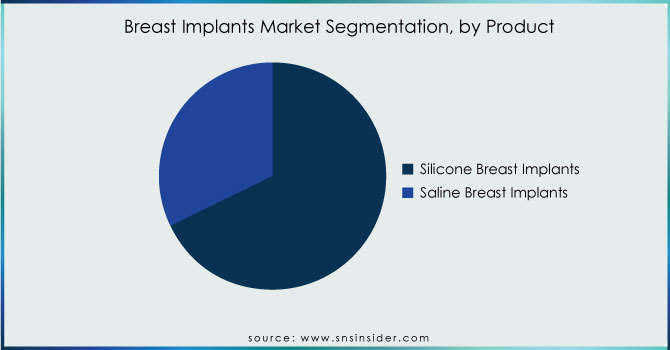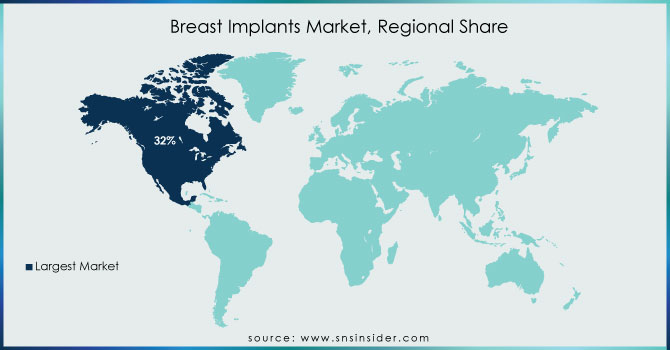Breast Implants Market Report Scope & Overview:

Get more information on Breast Implants Market - Request Free Sample Report
The Breast Implants Market Size was valued at USD 3.06 Billion in 2023, and is expected to reach USD 5.34 Billion by 2032, and grow at a CAGR of 6.67%.
With increasing awareness about body image and the need to enhance appearance, the trend of breast augmentation getting popular in emerging and developing countries. A study by the National Library of Medicine, published in August 2023 showed that breast augmentation has a positive effect on sexual function among women with hypomania. Furthermore, the increasing interest of women in beauty-enhancing breast augmentation and reconstruction surgeries is set to propel market growth.
There is a rise in breast augmentation surgeries worldwide. For example, as per the International Society of Aesthetic Plastic Surgery (ISAPS) on breast augmentations reported about 2.2 million breast augmentation procedures; there was a whopping increase of around 29% as per ISAPS. The increasing number of procedures is expected to boost the demand for breast implants which are generally consumed in such surgeries.
The worldwide increase in the number of breast cancer cases is also a contributing factor that propels the market growth. Based on estimates from GLOBOCAN 2022, breast cancer was the third most common type of all cancers with a global share of 11.5%. According to the Australian Institute of Health and Welfare's 2024 report, around 20500 new cases in females are expected for breast cancer about 28% share of all female cancers diagnosed. Breast cancer is the second most common cancer in Australia for Australians aged 20 to 39 and 60-79 years, with it being the largest killer for Australians of standard fertility age. So, the rising prevalence of breast cancer can drive the need for Breast implantation in the market to provide a necessary aesthetic boost over their forecast period thereby increasing global demand and also propelling the growth of this market.
MARKET DYNAMICS:
Key Drivers:
-
The Increasing Demand for Aesthetic Procedures Globally is Driving the Growth of the Breast Implants Market.
-
The Development of Silicone Gel-Filled Implants and the Introduction of Shaped Implants have Provided Patients with Natural-Looking Results, which are Fueling the Growth of the Market.
Restraints:
-
The High Cost of Breast Implants and The Associated Surgical Procedures is a Significant Barrier to Market Growth of Breast Implants.
-
The Stringent Regulatory Frameworks Governing the Approval and Use of Breast Implants Pose a Challenge to Market Expansion.
Opportunity:
-
Rising Disposable Incomes, Increasing Awareness of Aesthetic Procedures, and the Growing Influence of Western Beauty Standards are Contributing to the Rising Demand for Breast Implants.
-
Research Into Bioengineered Implants, which could Potentially Reduce the Risks of Complications and Provide More Personalized Solutions, Represents a Promising Area of Growth.
KEY MARKET SEGMENTATION:
By Product
The silicone segment held a major breast implant market share in 2023 with 68%. This is mainly due to the extensive presence of silicone implants in the market as well as their benefits over saline implants. It provides a natural look and aesthetic appeal as well. For example, a gummy implant provides fullness to a reconstructed breast just as naturally perceptible. These products are also not liable to give birth to immune system-related disorders. Also, there is less risk of hard scar tissue forming around the implant. Gummy implants also have a low potential for wrinkling. These factors play a key role in boosting the demand for these implants among the female population. Additionally, the saline implants are predicted to witness a healthy CAGR over the forecast period. They have a natural feel so it is the reason for their growth The fullness and firmness these implants offer is beneficial.

Get Customized Report as per your Business Requirement - Request For Customized Report
By Shape
Round shape implants, accounted for the largest revenue with 81% share in 2023. The round shape makes them the best option for breast augmentation. These devices generally appear to be condensed spheres. Thus, the demand for these products was always high and this boosted the market growth. Round-shaped implants allow for a solution to any rotation issues at the time of implant placement. That is why even surgeons prefer round implants to anatomical ones. Laboratoires Arion has a large collection of round breast implants for example Monobloc Silicone, a round-shaped implant manufactured by Laboratoires Arion.
By Application
Cosmetic surgery applications accounted for the largest revenue share of 2023, with a CAGR growth rate of 7.5%. Of course, it is happening largely because of the increasing trend of professionalization in the cosmetic industry to better aesthetic appeal. Breast augmentation cosmetic surgeries help in the beautification of this organ. The breast implant is a major operation in the cosmetic surgery world. The reason is that compared to other implants, they feel much more like natural breast tissue, and most women seeking to get placed in an artificial mammary gland give them a nod. Approved by the U.S. Food and Drug Administration (FDA) for breast augmentation in women 22 years or older, as well as breast reconstruction in women of any age. Reconstruction graft is expected to exhibit a major growth potential over the forecast period. It is a very common procedure that involves the correction of several functional defects and some aesthetic deformities in the chest wall after a mastectomy. This helps bring back its original look and makes it aesthetically appealing.
REGIONAL ANALYSIS:
North America Dominated the market with 32% in 2023. The high cost of the procedure as well as the implants, favorable health reimbursement, and the strategic position of major manufacturers in North America have seen the market expand. In the U.S. alone, in 2021, 378,700 breast augmentation procedures were carried out, which is highly likely to enhance the growth of this market in North America according to the American Society for Aesthetic Plastic Surgery. High preference for silicone implants and high demand for cosmetic products in Europe will likely drive the market in the region. Europe also has more active plans by the government to sensitize the population on the different implant types they can use to enlarge their breasts and other factors that enhance the market in Europe.
In Asia Pacific, an increasing growth rate is anticipated, mainly fueled by the quick adoption of cosmetic surgeries and the increasing number of breast surgery procedures conducted in countries such as China and India in recent times. Latin America seems to have a market that will enlarge in the future. Brazil performs the most procedures in this region, they already have a thriving medical tourism practice with many people traveling there for cosmetic surgery. MEA will also enlarge its market growth with the global market projected to grow in the future by increasing healthcare spending and infrastructure.

KEY PLAYERS:
The key market players are Polytech Health & Aesthetics GmbH, Allergan, Groupe Sebbin SAS, Sientra Inc., Establishment Labs S.A., Guangzhou Wanhe Plastic Materials Co., Ltd., Shanghai Kangning Medical Supplies Ltd., Mentor Worldwide LLC, Laboratoires ARION, GC Aesthetics & other players.
RECENT DEVELOPMENTS
-
In October 2022 – GC Aesthetics received CE mark approval for LUNA xt, a micro-textured anatomical breast implant. This approval confirms LUNA xt as the first implant to be approved under 2021 MDR.
-
Sientra, Inc. received regulatory authorization from the Saudi Food & Drug Authority in September 2022 to market silicone gel implants for use in breast implant procedures within Saudi Arabia.
| Report Attributes | Details |
| Market Size in 2023 | US$ 3.06 Billion |
| Market Size by 2032 | US$ 5.34 Billion |
| CAGR | CAGR of 6.67% From 2024 to 2032 |
| Base Year | 2023 |
| Forecast Period | 2024-2032 |
| Historical Data | 2020-2022 |
| Report Scope & Coverage | Market Size, Segments Analysis, Competitive Landscape, Regional Analysis, DROC & SWOT Analysis, Forecast Outlook |
| Key Segments | •By Product (Silicone Breast Implants, Saline Breast Implants) •By Shape (Round, Anatomical) •By Application (Reconstructive Surgery, Cosmetic Surgery) •By End-Use (Hospitals, Cosmetology Clinics, Ambulatory Surgical Centers) |
| Regional Analysis/Coverage | North America (US, Canada, Mexico), Europe (Eastern Europe [Poland, Romania, Hungary, Turkey, Rest of Eastern Europe] Western Europe] Germany, France, UK, Italy, Spain, Netherlands, Switzerland, Austria, Rest of Western Europe]), Asia Pacific (China, India, Japan, South Korea, Vietnam, Singapore, Australia, Rest of Asia Pacific), Middle East & Africa (Middle East [UAE, Egypt, Saudi Arabia, Qatar, Rest of Middle East], Africa [Nigeria, South Africa, Rest of Africa], Latin America (Brazil, Argentina, Colombia, Rest of Latin America) |
| Company Profiles | Polytech Health & Aesthetics GmbH, Allergan, Groupe Sebbin SAS, Sientra Inc., Establishment Labs S.A., Guangzhou Wanhe Plastic Materials Co., Ltd., Shanghai Kangning Medical Supplies Ltd., Mentor Worldwide LLC, Laboratoires ARION, GC Aesthetics & other players. |
| Key Drivers | •The Increasing Demand for Aesthetic Procedures Globally is Driving the Growth of the Breast Implants Market. •The Development of Silicone Gel-Filled Implants and the Introduction of Shaped Implants have Provided Patients with Natural-Looking Results, which are Fueling the Growth of the Market. |
| RESTRAINTS | •The High Cost of Breast Implants and The Associated Surgical Procedures is a Significant Barrier to Market Growth of Breast Implants . •The Stringent Regulatory Frameworks Governing the Approval and Use of Breast Implants Pose a Challenge to Market Expansion. |

